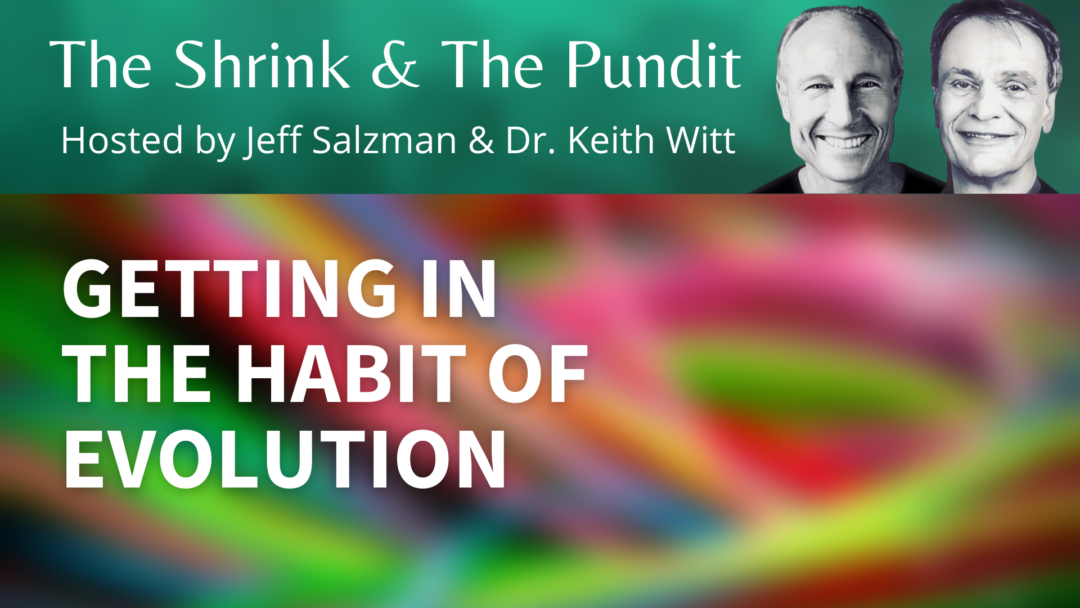Our left hemisphere learns new routines, but it is our right hemisphere where the habits are hardwired — and it changes slowly. The brain evolved to not give up habits that it has associated with a satisfactory life.
We are what we repeatedly do. —Aristotle
I learn the coolest stuff listening to The Shrink & The Pundit sessions. For example, as you repeat a certain action it activates a specific neuronal network in the brain. Cells go there and wrap the neurons in a myelin sheath (myelin is a white, fatty, electrically insulating substance). The myelinated nerve is up to one hundred times faster! If you practice enough those circuits become heavily myelinnated and then that action becomes habitual, like the way my fingers are hitting these keys — you don’t even need to think about it. Which is great! Until it isn’t.
Habits are hard to change. We can use pain and pleasure (the proverbial vinegar and honey) but mostly it just takes time.
A habit is a pattern of self-reinforcing processes. A Princeton study suggests that about forty percent of what we do during the course of each day is purely habitual. Dr. Keith thinks that’s a conservative number. In his forthcoming book, Integral Mindfulness: From Clueless to Dialed In, he explains that to change something is to first be aware of it.
Observation plus compassion equals mindfulness, and that’s your primary tool for regulating existing habits and creating new ones.
Keith learned from Ken Wilber that the universe is composed of habits that are including and transcending each other through the mechanism of chaos. The nature of chaos is that it seeks coherence (involution). That’s a force as powerful as gravity. Systems naturally want coherence so they create habitual ways of being. It’s life’s general shape or mode of growth. Every once in a while a stable state is disturbed, there’s a disintegration and then a re-integration into something different. The universe has reorganized and created a habit that is more complex. Those more complex habits appear simpler but they’re not.
“You could say humans have a habit of self transcendence,” Dr. Keith Witt
A hundred years ago, William James famously declared that it took twenty-one days to create a habit. Modern neuroscience would say he wasn’t too far off. Integrative neurons start creating hard wired circuits back to your amygdala after about thirty days of doing something different.
A spiritual teacher of mine named Sylvia used to say the most powerful thing we have is our attention, and in that moment when you realize you have the power to switch the energy from point A (your habit) to point B (your new intention) it is the most powerful moment in your life. Sometimes you have to apply that attention over and over and over until it begins choosing itself.
Saying no to one thing by saying yes to another is called a reciprocal inhibitor.
Studies have shown that people are twenty-five times more successful if they try to cultivate a new habit rather than just resist the bad one.
So instead of smoking a cigarette, do a breathing exercise. Instead of eating a bag of chips, take a walk.
 It’s hard work, so it helps to get excited, and have someone that inspires you and embodies where you want to go. Even better yet, get that person to coach you. If you can engage repeatedly in the process where you go to the edge of where you’re competent and you make a mistake, correct it, make a mistake, correct it…that is a growth mindset. You have to be willing to be intimate with your weakness.
It’s hard work, so it helps to get excited, and have someone that inspires you and embodies where you want to go. Even better yet, get that person to coach you. If you can engage repeatedly in the process where you go to the edge of where you’re competent and you make a mistake, correct it, make a mistake, correct it…that is a growth mindset. You have to be willing to be intimate with your weakness.
An integrally informed mindfulness can give you a higher quality of self-awareness. Jeff often likens it to Google Earth, where you can view the whole picture and also zoom in to a precise address. There’s just more information in that kind of granularity — lines of development, what quadrant you’re operating in, your state of consciousness. Even your typology can be likened to a bundle of habits that you’re predisposed to perform, and knowing what those are can be immensely helpful.
Integral is a developmental system in four quadrants. This is where it really trumps 20th century developmental psychology. 20th century developmental psychology shifts quadrants unconsciously and it’s frankly quite confusing, but integral doesn’t do that. So you can see the healthy expression of your current developmental level and what your next developmental level is. You can adjust yourself in terms of observing your good and bad habits and start cultivating good habits that involve horizontal health, which is more healthy with your current worldview, and vertical health which encourages you to move forward. – Dr. Keith Witt
That self observation, even if it has compassion in it, is still coming from a worldview, a specific perspective. But you’re aware of it and you’re aware of others that are available to you. You know what’s more healthy and less healthy and more or less what serves development. That’s a superior form of mindfulness.
But then it gets really interesting.
Earlier in life, when you’re in a Socialized Mind stage, the culture around you largely determines what your habits will be. As you evolve — if you evolve — you move into a Self-Authoring stage of development, where you are cultivating the ability to expand your choices and shape your own habits. People moving into second tier consciousness, or what can loosely be correlated with Kegan’s Self-Transforming stage, begin to find something very different. It feels like they start losing choice.
Why? Because development goes in a particular direction and the lines converge towards service to God and service to the world. And so after a while your life starts informing you on the habits that you’re going to have to change and the habits that you’re going to have to cultivate, and that’s self-transforming mind. – Dr. Keith Witt
It feels like you begin to lose choice because in a way, you do. The deeper currents become more available and conscious to us as we develop and in general they lead us to habits that are more beautiful, good and true. You’re also unlikely to be rigid about them.
Jeff says that cultivating second tier consciousness often feels to him like he’s “being lived.” I can relate to that. “At this stage in the game it feels like a lot of it is just unfurling the sails, and allowing the moment to inform where I’m going and what I’m doing and what’s appropriate. What’s the best use of Jeff in this moment, in this day?” Losing choice turns out to be a higher form of liberation.
So enjoy this latest installment of The Shrink & The Pundit and let us know what you think on Facebook or Twitter.
Podcast: Download
Subscribe: Google Podcasts | RSS







Gawd I love you guys. Thank you.
Thank you Angelika 🙂
Aw shucks
I felt a tiny bit of the dream transmission as Keith recounted his dream to Jeff. Thank you Jeff for continuing this work. Mary